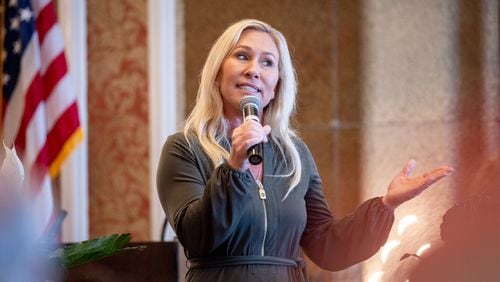The financially troubled DeKalb County School District has been spending more on lawyers than similarly sized metro Atlanta school systems for years, and is on track to spend even more.
The millions of dollars DeKalb pays for lawsuits and other legal expenses could instead be paying for badly needed teachers and classroom aides. Like other districts, DeKalb has watched tax receipts shrivel and has slashed its budget, imposing furlough days and driving up class sizes while cutting back on support services such as bus maintenance.
However, unlike other districts DeKalb has increased its anticipated legal expenses. The district expects to spend more than $9 million in the fiscal year ending June 30 — more than the Gwinnett, Cobb and Fulton county school systems combined, according to an analysis by The Atlanta Journal-Constitution. DeKalb is on track to spend more than 11 times more per student than Gwinnett, Georgia's largest school system.
DeKalb has continued its big spending on lawyers in the face of public criticism. A grand jury raised questions about legal expenses last year and the Southern Association of Colleges and Schools accreditation agency cited "excessive" legal fees among its concerns about mismanagement when it placed the district on probation in December. Last week, two DeKalb residents filed a lawsuit alleging the district has illegally gone into debt for legal fees.
Interim DeKalb Superintendent Michael Thurmond has been on the job two months and said he doesn’t know why the legal costs are so high. He said he wants to cut legal spending and plans to inspect every new invoice.
“We’ve spent in a month almost what most school districts spend in a year,” Thurmond said.
It’s difficult to judge how much legal billing is too much. The costs can depend on several factors, including the number of real estate transactions or ticked-off former employees or contractors.
“It all depends to a great extent on how many people are suing you and so forth,” said Jim Puckett, who teaches school board members about governance for the Georgia School Boards Association.
Lawsuits are inevitable, especially in larger districts, Puckett said. “Metro systems would probably tend to get sued more often, and for larger dollar figures than the rural ones,” Puckett said.
That does not explain why DeKalb, Georgia’s third-largest school system, has been outspending its peers, including bigger districts.
DeKalb had more than $6 million in legal expenses in each of the past two years. Meanwhile, Gwinnett reported spending less than $2 million both years. Cobb and Fulton, both nearer in size to DeKalb, had legal bills that topped $2 million in 2012.
Gwinnett, Cobb and Fulton cut their legal budgets this year. Gwinnett budgeted $1.4 million, or $8 for each of its 165,000 students. DeKalb’s projected legal costs amount to $94 for each of its 98,000 students.
Lawyer Glenn Brock, who has represented the Cobb and Fulton systems, said DeKalb’s legal expenses sound high. Brock said the district’s fees are an “outlier that is just so far out of the norm.”
There are varying theories as to why DeKalb spends more.
District spokesman Jeff Dickerson said he thinks a six-year-old lawsuit against former construction manager Heery International Inc. drove up costs.
On Friday, a Heery executive who lives in DeKalb joined with a local parent in filing a lawsuit alleging that the district's contract with its lawyers in that case is unconstitutional because the fees put the district in "debt."
Last year, the DeKalb grand jury questioned the school board’s decision in 2009 to hire two firms as general counsel. Alexander & Assoc. handles personnel matters, and Sutherland Asbill & Brennan deals with most other routine issues.
“You do not need the number of legal advisers that you have,” Mark Elgart, president and chief executive officer of SACS parent company AdvancED, recently told the school board. “There is no other urban school system in just the metro area that has two law firms on retainer.”
He called the legal costs a “glaring” waste that must be addressed in the upcoming budget. “This is an area where we’re going to expect significant change and improvement because these are resources that should be [used] elsewhere,” Elgart said.
Attorneys from both law firms did not return calls for comment.
Zepora Roberts, who was on the school board when the two firms were hired, said one firm could have done the job but “we wanted to make sure we had some African-American representation, so we split it in half.” Josie Alexander of Alexander & Assoc. is black.
Still, Roberts conceded Elgart’s point about legal costs.
“A lot of that money we have spent on legal should have gone to the classroom,” she said.
DeKalb said it has paid Sutherland $8.2 million since 2009 and Alexander $9.7 million since 2000 (the firm did some DeKalb work prior to 2009).
The amount at stake may not sound like much in a district with $732 million in projected revenue. But the money could have come in handy last summer when the school board cut the budget by $78 million. It could have paid for the 200 classroom paraprofessional positions eliminated or the two teacher furlough days added to the calendar. It also could have helped restrain growing class sizes.
Kimberley Evans, a former DeKalb teacher who has two children in the system, said teachers are demoralized. At least some of the money being spent on lawyers should be going to them, she said.
“When I see it in real dollars I just think it has to stop,” Evans said. “Somebody has got to stop the bleeding.”
--------------------------------------------------
LEGAL COSTS
Sources: Dollars from school systems, student counts from Georgia Department of Education.





